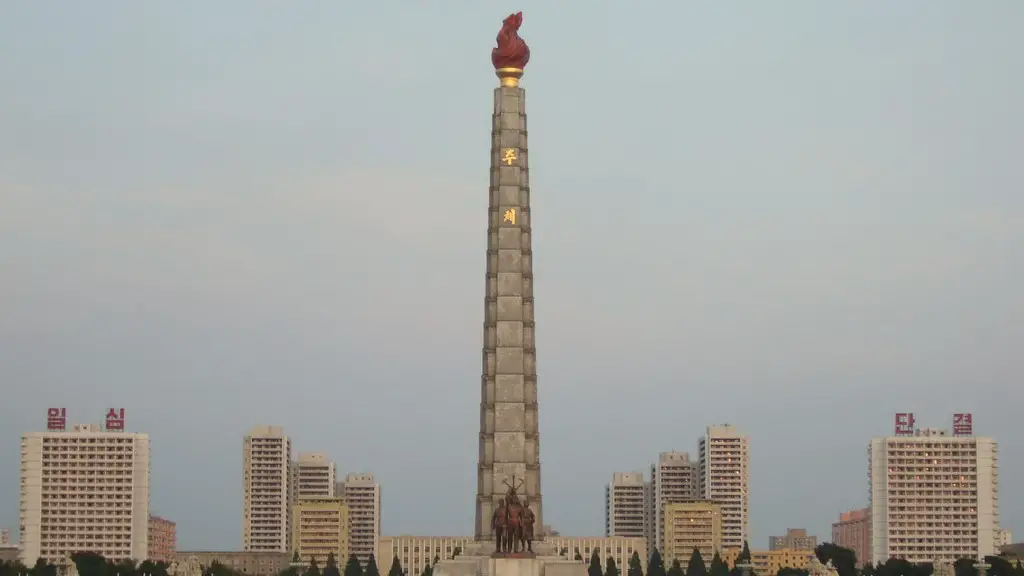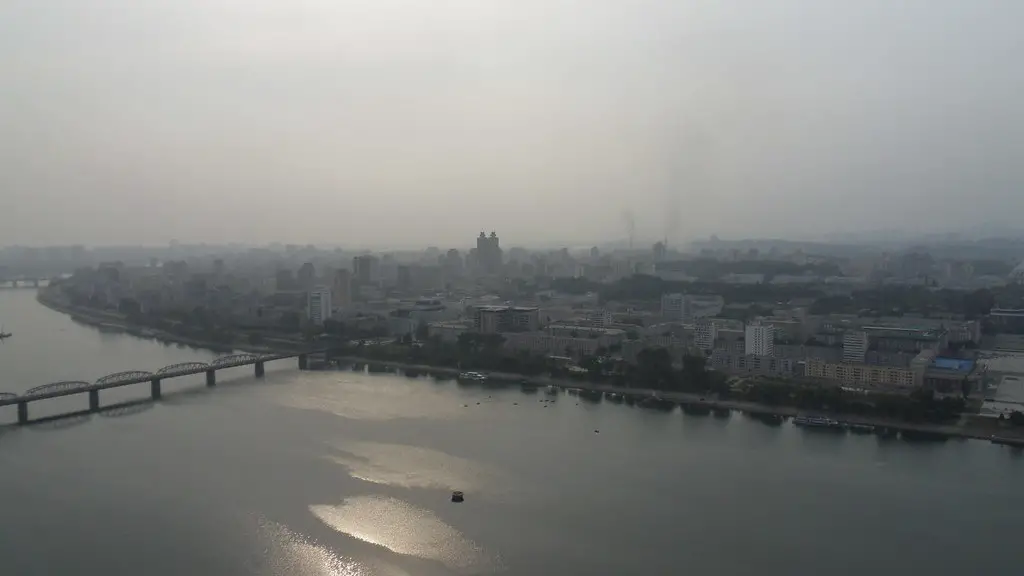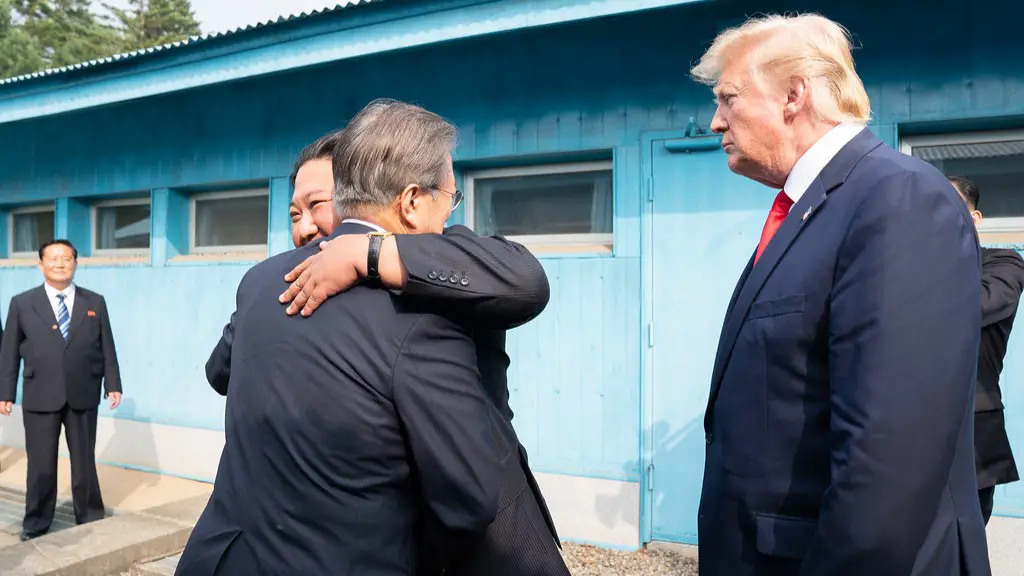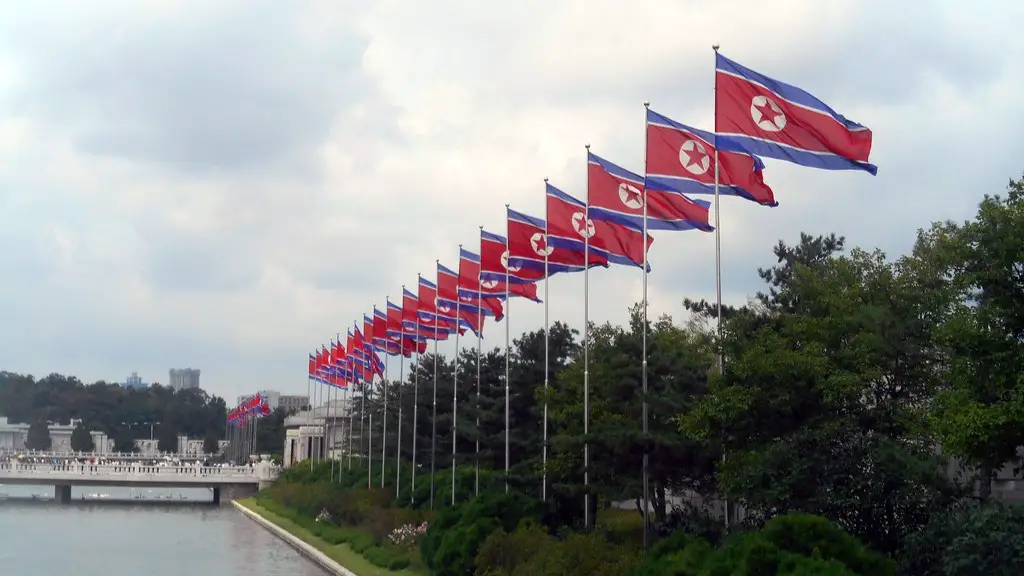Should we declare war on North Korea? It is a question that has been asked for decades and remains a topic of much controversy. After all, North Korea is a country with a dangerous and often aggressive foreign policy, numerous nuclear weapons, and an unpredictable leader. But, what would be the implications of declaring war on North Korea?
It is important to consider North Korea’s history and current military capabilities in assessing this question. North Korean leader Kim Jong Un has become increasingly belligerent during his time in power, and Pyongyang has threatened war against South Korea and the United States multiple times. North Korea also has a large arsenal of nuclear weapons, has conducted nuclear tests in recent years, and is suspected of having a long range missile capable of reaching the west coast of the United States. These weapons could be used in the event of a war against the United States.
The United States and its allies have developed a strategy of “strategic patience”, or a strategy of wait and see, when it comes to North Korea. This strategy has been in place since the 1990s and thus far it has been effective in preventing an outbreak of war. However, this strategy has also been harshly criticized by some who argue that it allows North Korea to continue to pursue its nuclear ambitions without any repercussions.
Experts, then, are divided in their opinions about whether or not the United States should declare war on North Korea. On the one hand, war could certainly destroy North Korea’s nuclear weapons and bring an end to its nuclear program. On the other hand, a war with North Korea would likely involve casualties in the millions, not to mention the destructive economic effects and the risk of nuclear fallout.
The United States should also consider the international implications of a war with North Korea. A war could potentially draw in other countries, such as China and Russia, who may have a vested interest in the region. The United Nations Security Council could also be involved, as the organization has often been at the center of international negotiations with North Korea.
Clearly, this is a complex issue and one with no easy answer. In assessing whether or not the United States should declare war on North Korea, we must carefully consider the potential risks and benefits, as well as the international implications at play.
Economic Impact Of A War With North Korea
Undoubtedly, any war with North Korea would have a devastating economic impact. It has been estimated that the economic losses from a war with North Korea could be upwards of $1 trillion USD. In addition, the disruption of trade between North Korea and its trade partners could further exacerbate the economic damage. Furthermore, the global economy could be severely impacted if other countries, such as China or Russia, were to become involved in the conflict.
A war with the North could also result in a mass exodus of refugees from the region, which could further put a strain on economic resources. The United Nations estimates that a war on the Korean Peninsula could result in up to two million refugees. These refugees would need to be supported by other countries, putting additional strain on global resources.
In addition to the direct economic costs of a war, the psychological impact of such a conflict could further damage the global economy. For example, investor confidence may be diminished in the face of such a conflict, resulting in reduced investments and a GDP downturn.
Given these potential impacts, it is clear that a war with North Korea would have significant economic implications. Thus, any decision to declare war on the North should be carefully weighed against the potential economic costs.
International Sanctions
In addition to the economic losses from a war, it is important to consider the effects of international sanctions against North Korea. These sanctions, which are placed on North Korea by the United Nations Security Council, aim to restrict the country’s economy in hopes of bringing it back to the negotiating table. These sanctions have been in place since 2006 and generally focus on reducing the country’s access to foreign currency, financial assistance, and imports.
The international community has generally viewed the sanctions to be successful in reducing North Korea’s nuclear ambitions. However, they have also been criticized for having a severe impact on the North Korean people, who have been deprived of access to basic goods and services. It is important to consider these implications when assessing the effects of international sanctions against North Korea.
Furthermore, the sanctions have been seen to weaken North Korea’s regional diplomatic relationships. Pyongyang has found itself increasingly isolated in the region, as its traditional allies, China and Russia, have both been threatened with sanctions if they continue to facilitate North Korea’s economy. This isolation could be a potential catalyst for a conflict in the region, and thus should be taken into consideration when evaluating the impact of the sanctions on the situation.
Ultimately, the effectiveness and implications of the international sanctions against North Korea should be closely considered as part of any decision to declare war on the North.
Geopolitical Dynamics
It is also important to consider the geopolitical dynamics at play when assessing the effectiveness of declaring war on North Korea. In recent years, North Korea has become increasingly isolated and the country has grown more belligerent towards its neighbors, particularly South Korea and the United States. This has resulted in greater tension in the region, with the United States and its allies increasingly threatening a preemptive strike against North Korea.
Furthermore, North Korea has become increasingly emboldened by its relationship with China and Russia, both of which have traditionally been allies of the North. This has led to a shift in power in the region and caused some to question whether or not the United States should continue its “strategic patience” approach.
In addition, the geopolitical situation in the region has also been complicated by China’s growing influence in the region. This has resulted in increased tension between the United States and China, as both countries have been vying for supremacy in the region. This dynamic could have serious implications if a war were to break out, as China could become directly involved in the conflict.
Given the complicated geopolitical landscape and the risks of a larger conflict in the region, it is essential to consider the geopolitical dynamics at play when assessing the potential outcomes of a war with North Korea.
Human Cost
Finally, any potential decision to declare war on North Korea must factor in the potential human cost of such a conflict. It is estimated that a war between North Korea and the United States could result in up to one million casualties, with millions more harmed by the economic and environmental consequences of the conflict.
This would be a devastating toll for both sides, but especially for the people of North Korea. Pyongyang has focused heavily on military spending in recent years, spending billions of dollars to build its nuclear arsenal. This has resulted in a nation with little economic development, leaving much of the population living in poverty and deprived of basic necessities such as food and healthcare.
It is clear, then, that a war with North Korea would be a catastrophe for the North Korean people. Any decision to declare war must take this into consideration, as the potential human cost of such a conflict is simply too high to ignore.
U.S. Military Capability
In addition to the potential human cost of a war with North Korea, it is also important to consider the United States’ military capabilities as part of any decision to declare war. The United States has a large and powerful military, but is North Korea an adversary that can be conquered using conventional military force?
The technical capability of the North Korean military should not be underestimated. North Korea has a large and well-equipped army, which includes a formidable air force, navy and missile capabilities. Furthermore, Pyongyang has a considerable stockpile of chemical and biological weapons, which could be deployed in the event of a conflict.
Given the formidable capabilities of the North Korean military, it is clear that the United States would face a challenging military operation in the event of a war. Furthermore, defeating North Korea would likely require a lengthy and costly campaign, potentially lasting years. Thus, the United States should carefully assess its military capabilities before deciding to declare war on North Korea.
Relations with South Korea
The potential conflict with North Korea would not only affect the United States, but also have serious implications for South Korea. Seoul has long been engaged in tense negotiations with the North, and a war would undoubtedly bring further instability to the region.
Furthermore, it is essential to consider the South Korean government’s opinion of a potential conflict. The South Korean government has been clear in its opposition to a preemptive strike against North Korea, as Seoul is certain to bear the brunt of a potential conflict. This reluctance to engage in a war has been a source of tension between the United States and South Korea, as both sides have recently come to the brink of war.
It is also important to consider the potential effects on the South Korean economy. Any war would bring economic disruption, with investors inevitably pulling their investments out of the region. It has been estimated that a war could cost the South Korean economy up to $500 billion USD, a devastating loss in such a small country.
Given the potential disruption to the South Korean economy and the negative opinion of a war held by the South Korean government, it is essential that the United States carefully assesses these issues before deciding to declare war on North Korea.
Conclusion
Clearly, there is no easy answer to the question of whether or not the United States should declare war on North Korea. There are a number of potential implications of such a conflict, ranging from the potential human cost to the sensitive geopolitical dynamics at play in the region. Furthermore, any decision to declare war must consider the potential economic, international, and geopolitical implications. Ultimately, it is essential that the United States weighs all of these issues carefully before deciding on any course of action.





